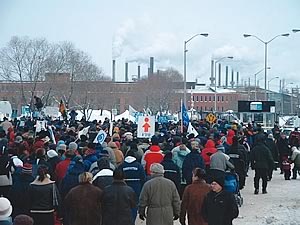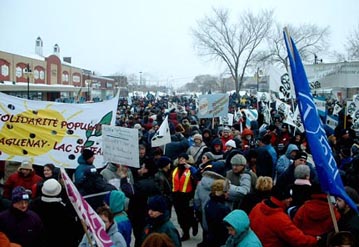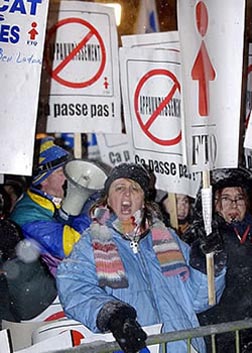Power of Labor

Charleston Five longshoremen arrested for defending picket lines
against cop attack (January 2000)
click on photo for article

South Carolina clay miners appeal for solidarity in fight for
their union (October 2001)
click on photo for article
Declaration of War on Dock Workers and All Labor (October 2002)
click on photo for article
September 2004
![]()
![]()

“Our prices are lower” – the wages too. Wal-Mart in Jonquière,
Quebec.
It’ll Take Hard Class Struggle to
Beat the Labor-Hating Giant
The following article is expanded from an Internationalist
Group leaflet distributed at the September 1 Labor Day demonstration in New
York.
In the 1990s, as higher-paid industrial jobs disappeared, the only “alternative” for many laid-off workers in hard-hit “Rust Belt” communities, and for millions of young people joining the workforce, was minimum-wage work flipping hamburgers at the local McDonalds: “McJobs,” we called them. Today, “Walmartization” has come to symbolize the assault on workers’ pay and conditions internationally. Wal-Mart, the Bentonville, Arkansas-based retail chain, is now the largest employer in the United States, with 1.3 million workers who average $9.50 an hour. Out of their toil, the mega-company racks up $270 billion in yearly sales and $60 billion in annual profits. Not a single one of its 3,500 stores in the U.S., 633 stores in Mexico and 225 stores in Canada is unionized. Until now.
On August 2, the Quebec Labor Relations Board ruled that a majority of the hourly employees of the Wal-Mart store in Jonquière (part of the city of Saguenay), had signed up with the union, and on that basis it recognized Local 503 of the TUAC (Canadian United Food and Commercial Workers) as their representative. TUAC is part of the Quebec Labour Federation (FTQ) and affiliated with the American UFCW. The fact that workers in this northern region had won a union, making it the only unionized Wal-Mart store in all of North America, should put Jonquière on the map of the labor movement. It was big news around the world. The London Guardian (4 August) ran a story, “Wal-Mart’s Quebec staff win union rights.” It made the news in Mexico (La Jornada, 4 August), where Wal-Mart is also the largest employer. But U.S. papers blacked it out.
Wal-Mart is synonymous with the destruction of unionized
jobs with wage levels and benefits won through years of hard struggle, replaced
by $8 an hour entry-level pay, with minimal or no health insurance and pension.
A viciously anti-labor management which regiments employees with daily meetings
and chants, tries to brainwash them with company ideology (the thoughts of
Sam Walton), discriminates against women, forces its “associates” to work
through their meal breaks, locks cleaning crews (many of them undocumented
immigrants without rights, hired through subcontractors) in at night, and
in the blink of an eye fires anyone who looks cross-eyed at a manager: that’s
Wal-Mart. The mere rumor that Wal-Mart might open a store locally has led
competitors to slash wages and benefits wholesale.
The threat of Wal-Mart setting up stores in southern
California set off the bitter UFCW supermarket strike that lasted from October
2003 to February 2004 and ended in a defeat for the union, with wages for
new hires cut by up to $2.80 an hour, worker “co-payments” for health insurance
introduced, employer medical payments capped, and company pension fund payments
cut (see “California Grocery Strike Sold Out,” The Internationalist No.
18, May-June 2004). In June, the Service Employees International Union (SEIU)
headed by Andrew Stern announced a $1 million organizing drive at Wal-Mart.
The same week, a federal judge ruled that workers could sue the company in
a class-action suit for sex discrimination. But looking to the bosses’ courts
and throwing in some dollars will not organize Wal-Mart. It will take
hard class struggle.
The Internationalist traveled to northern Quebec in mid-August
to speak with the Wal-Mart workers. We arrived as they were about to begin
a celebration of their victory. Union members and Local 503 officials were
in high spirits. Scoring against the union-busting behemoth is no small thing.
The arrogant Wal-Mart bosses are used to steamrollering over anything that
gets in their way. But the around 170 workers at Jonquière, 80 percent
of them women, wouldn’t lie down to be rolled over – they stood up to fight
for their rights. It’s what one might expect in this solid union town. Yet
Wal-Mart management was taken by surprise. They figured they had the union
beat when TUAD narrowly lost a representation election in April. But the
workers came right back at them, and three months later they had signed up
enough so that the union had a solid majority even if the company tried to
include management employees, “plus a few customers on Monday morning,” said
UFCW International rep Herman Dallaire.
 “Our team
makes all the difference” – Wal-Mart caught by surprise by union victory
at Jonquière, Quebec. (Photo: Pascal Rathé/Le
Devoir)
“Our team
makes all the difference” – Wal-Mart caught by surprise by union victory
at Jonquière, Quebec. (Photo: Pascal Rathé/Le
Devoir)
Union militants told us that the key issues were
wages and “R-E-S-P-E-C-T” – which is spelled the same in French or English,
and Wal-Mart bosses don’t get it or give it. Starting pay is $8 Canadian
an hour (which works out to under US$6), little more than the legal minimum
wage in Quebec, compared to $13 at the unionized Costco in nearby Chicoutimi.
Theoretically this could rise to $9.50 after several years, but the store
hasn’t been open that long. Of course, with the rampant favoritism, those
employees who go along and get along with management may be named “department
managers,” who are just glorified foremen paid a few dollars more. No cases
of overt sexual harassment were cited, but what really made the women furious
was how Wal-Mart managers tried to humiliate individual workers in the morning
meetings, “saying that they are lazy…that they ask for days off.” It was
after one such session that they called up the union.
“If a manager notices an employee not applauding
or signing the [company] song in the morning several times, it’s noted and
that means a definite loss of a $10 raise. We also want to put a stop to
the practice of new women workers advancing over the more experienced workers,”
a union supporter told the Saguenay Progrès-Dimanche (28 March).
Another acutely felt complaint is the absence of planning the workweek in
advance. (28 hours a week is considered full-time, and many women work as
few as 12 hours a week.) They are essentially “on call,” like temporary workers,
and if they turn down work, that will be noted in the yearly evaluation.
This is particularly difficult for women who have to juggle work and family.
“For example, what if you have a child who is sick and you miss work?”
One woman said she had always worked under union
conditions, and wasn’t about to take this kind of guff. They already tried
in 2002 to organize a union, affiliated with the CSN (National Union Federation),
which ended in a defeat. But she and another woman weren’t deterred. When
Wal-Mart tried its ploy of locking the cleaning crew in at night, workers
denounced this illegal abuse and forced the company to abandon it. By December
2003, enough Wal-Mart employees had signed cards for TUAD to force a new
election. Local 503 president Marie-Josée Lemieux said that key in
beating back company harassment was the existence of a workers’ committee
inside the store. What was decisive, Dallaire told Recto Verso (January-February
2004), was that “we have a couple of courageous and determined women on the
scene.”
 800 workers from Saguenay
block Route 175 north from Quebec in protest over Charest government union-busting
laws, 11 December 2003. (Photo: Mishell Potvin)
800 workers from Saguenay
block Route 175 north from Quebec in protest over Charest government union-busting
laws, 11 December 2003. (Photo: Mishell Potvin)
Another vital factor was the tradition of union
struggle in Quebec generally and particularly in the Saguenay-Lac-St.-Jean
region, an industrial area of huge lumber, paper, hydro-electric and aluminum
mills. Last December, when the Liberal Party government of Jean Charest was
getting ready to push anti-union laws through parliament, thousands of unionists
converged on the National Assembly in Quebec City in the midst of a snowstorm,
surrounding it, pelting the building with snowballs, eggs and yellow paint.
Highway 175 north to Chicoutimi was cut off by a demonstration of 800 and
truckers who dumped huge loads of sand on the pavement, effectively sealing
off the region. This only ended when the Surêté de Québec
police intervened at midnight to arrest 15 people, including the FTQ representative,
Jean-Marc Crevier. Two days later, several thousand workers in Saguenay marched
to protest the indefinite layoff of 640 workers by the Abitibi-Consolidated
paper mill at La Baie. On May 1, the FTQ, CSN and other union federations
called a huge demonstration in Montréal which brought out between
75,000 and 100,000 demonstrators – the largest May Day march in Quebec’s
history.
In January, the management of Alcan announced at
the gathering of the international capitalist elite in Davos, Switzerland
that it was planning to close the Söderburg smelter of the aluminum
multinational’s Arvida plant in Jonquière. Instead of just accepting
this body blow, the 550 workers of the smelter and their union, the SNEAA
(affiliated with the Canadian Auto Workers), occupied the plant, continuing
to produce for 19 days until the Quebec Labor Relations Board ruled their
action illegal. Pointing out that the company wanted to use the power from
the foundry to supply other aluminum plants in the region, the workers demanded
the nationalization of Alcan’s hydroelectric installations in Saguenay/Lac-St.-Jean
(L’aut’courriel, 11 February). The workers’ occupation of the plant
sent shock waves around Canada and drew broad support in the region, with
a January 31 protest demo of more than 5,000 supporters. But the action of
the labor board here should shatter any illusions that workers could somehow
get justice from the capitalist courts and government.
 More
than 5,000 demonstrated in Saguenay, 31 January 2004, in solidarity with Alcan
aluminum workers who occupied plant in faces of Alcan bosses’ threat to close
foundry.
More
than 5,000 demonstrated in Saguenay, 31 January 2004, in solidarity with Alcan
aluminum workers who occupied plant in faces of Alcan bosses’ threat to close
foundry.
(Photo: Mishell Potvin)
Instead of limiting the occupation to a single foundry scheduled to be closed,
the unions should have shut down production at all Alcan plants. This is
still a burning question, as more than 800 workers at the ABI aluminum plant
at Bécancour in the city of Trois-Rivières have been on strike
since July 7. ABI management is threatening to bring in scabs, despite a
Quebec law that supposedly prevents the use of “replacement workers.” Simultaneously,
some 400 iron ore workers in Sept-Îles on the north coast of the St.
Lawrence River are striking since the beginning of August. And now, Alcan
is threatening to shut its Vaudreuil plant at Jonquière, threatening
the jobs of 1,200 workers. If Wal-Mart management tries to play hardball
to defeat the unionization attempt at Jonquière (for example, by threatening
to close the store, as McDonald’s did in Montréal), the key to labor
victory will be mobilizing unions throughout the region which have real industrial
power.
Ultimately, the battle to unionize Wal-Mart, from
a single store in the forests of northern Quebec to the entire multinational
chain, will pose a sharp class battle. And as Karl Marx and Friedrich Engels
noted over a century and a half ago, every serious class struggle is a political
struggle. What’s needed is a workers leadership that can stand up to the
courts, the cops, and the capitalist parties and government they serve. UFCW
leaders look to Quebec because local labor laws are more favorable than in
the U.S. or elsewhere in Canada, permitting a simple “card check” rather
than a phony election to decide union representation, in which bosses freely
intimidate workers with threats and bribes. But the fight to win a union
will not be won by playing by the bosses’ rules.
 It’s necessary to mobilize workers’ power to defeat the union-busters.
Saguenay, 31 January 2004.
It’s necessary to mobilize workers’ power to defeat the union-busters.
Saguenay, 31 January 2004.
Photo: Mishell Potvin
Quebec’s rate of union representation far exceeds
anywhere else in North America (42 percent of all workers, compared to 13
percent in the U.S.). It didn’t get that way by bowing down to or basing
the struggle on what is or is not permitted by the bosses’ legal arsenal.
Today, Quebec unions face a frontal attack by Charest with his plan for “reengineering
Quebec.” Writing in Quebec’s Le Soleil (3 December 2003), Normand
Provencher asked if Charest intended “A Wal-Mart Government?”:
“And if reengineering the state in these times of free trade and globalization simply comes down to the Wal-Mart approach: create lots of non-union jobs, with the lowest possible wages and social benefits. Is that what’s in store for Quebec workers?”
The FTQ, CSN and other unions have passed resolutions
calling for a “general strike” against the Liberal Charest government and
its anti-union laws … when the leaderships judge the timing to be right.
But a real general strike is not a big parade but a showdown with the bourgeoisie,
a knock-down, drag-out battle to decide “who is master in the house,” on
the order of the tumultuous 1972 Quebec general strike in which Sept-Îles
was taken over by the workers. But the 1972 strike ran into the ground precisely
for the lack of a revolutionary leadership.
Bosses all over Quebec are alarmed by the accreditation
of the Wal-Mart union. The business weekly Les Affaires (14 August)
headlines, “Quebec, Paradise for the Unions.” This organ of the employers
complains that not only is the unionization rate higher than anywhere on
the continent, while it has been falling elsewhere, in Quebec it has been
rising in recent years. At the same time, the article notes that Metro supermarkets
(organized by TUAC/UFCW) are “demanding a wage cut in order to remain competitive
faced with the imminent arrival of Sam’s Club in Quebec….” In fact, as history
professor Jacques Rouillard of the University of Montréal points out,
“The unions are on the defensive” (quoted in a feature article, “Quebec Unionism
in Quicksand,” in Montréal’s Le Devoir (7-8 August). Rouillard,
author of Le syndicalisme québécoise: deux siècles
d’histoire (Boréal, 2004) is pessimistic: “We’re always expecting
a turnaround with the union movement taking the officensive, but it hasn’t
happened. Governments always put the economy ahead of social questions.”
Yet these are capitalist governments who will always
stand on the side of the bosses against the workers!
 Unionists surrounded Quebec’s National Assembly in middle of snowstorm
on 15 December 2003 to protest Charest government’s union-busting laws. (Photo:
FTQ)
Unionists surrounded Quebec’s National Assembly in middle of snowstorm
on 15 December 2003 to protest Charest government’s union-busting laws. (Photo:
FTQ)
To defeat a giant like Wal-Mart, working people
must look to their own class power. Victory will not be won by relying on
the bourgeois courts, labor departments and politicians, nor by appealing
to localism, nationalism and protectionism, but by mobilizing the strength
of working people around the globe. The battle over unionization in Quebec
is part of the overall class struggle internationally, which in the past
couple of years has seen a demonstration of 250,000 in Montréal (and
3,000 in Chicoutimi) against the Iraq War … as well as a practice occupation
of Sherbrooke by the Canadian Army (which put the whole of Quebec under martial
law in 1970). The imperialist war on Iraq (and the occupation of Haiti by
Canadian imperialist troops) is intimately linked to the bosses’ war on the
workers “at home.”
For years, Quebec has been rent by battles over
its status in the Canadian state. Quebec labor is tied to the Parti Québécois
(PQ), a nationalist capitalist party which represents certain layers of the
local ruling class, who would like to cut a better deal with U.S. imperialism
by loosening their ties to the rest of Canada, in the formula “sovereignty-association.”
The Liberals have solid support from other Quebec capitalists who would like
to join in the exploitation of the working class across Canada. The Internationalist
Group and League for the Fourth International call for independence of Quebec,
at the same time as we fight on the program of proletarian internationalism
against the bourgeois nationalists as well as the petty-bourgeois nationalists
such as the Union des Forces Progressistes (UFP), SPQLibre and Option Citoyenne
who orbit around the PQ.
Periodically, when Wal-Mart stores or McDonald’s
restaurants have opened, there have been calls for consumer boycotts, often
with a protectionist/nationalist flavor, such as the campaign to “boycott
American products” publicized by “anti-globalization” liberals of Alternatives.
Such campaigns target Wal-Mart employees along with the bosses, while dividing
workers along national lines. But Quebec bosses are no better than their
U.S. or English Canadian counterparts. The Quebecor World conglomerate, headed
by Pierre Karl Péladeau, is the largest printer of periodicals and
catalogues in the world, including Time magazine and the Victoria’s
Secret catalogue. Péladeau, a former Maoist (one-time member of En
Lutte!) not only broke the strike at Vidéotron (which he bought with
money from the PQ government) but is charged with racist union busting by
black women workers in Quebecor World printing plants in Memphis, Tennessee
and Mississippi.
The struggle at Wal-Mart and Arvida in Jonquière,
as well as the struggles of tens of thousands of militant Québécois
workers, requires ousting pro-capitalist leaders who tie the unions to the
bosses and their parties. In the United States as well, the battle against
“Walmartization” will be fought out politically. Republican vice-president
Cheney praises Wal-Mart as a showpiece of the Bush administration’s economic
policies, while Democratic presidential candidate John Kerry piously criticizes
the company’s failure to provide benefits. Yet the Democrats are no answer:
it shouldn’t be forgotten that Hillary Rodham Clinton was a lawyer for and
for six years a board member of Wal-Mart.
From Quebec to the U.S., the struggle against imperialist war “abroad” and capitalist war on the working people, minorities, immigrants and poor “at home” requires the forging of a class-struggle workers party that fights for a workers government and international socialist revolution. n
